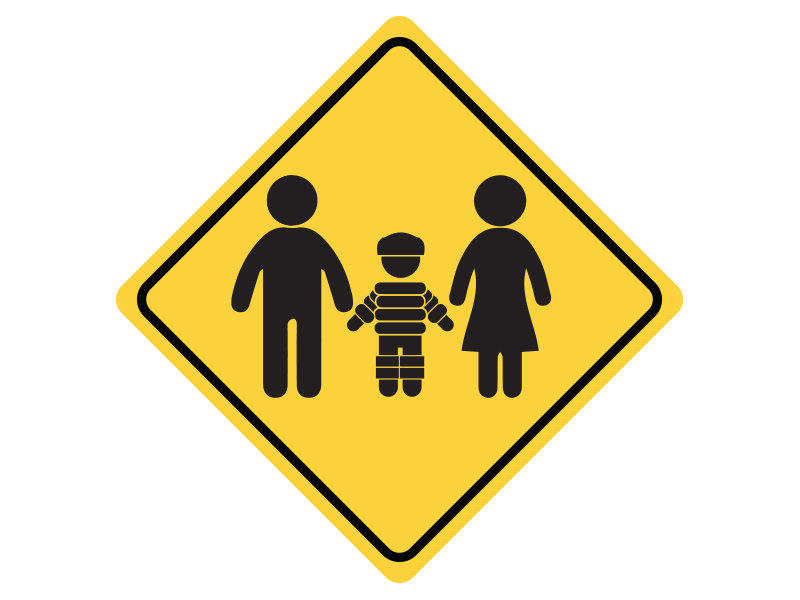How much is too much?
Parents protecting their child from harm is a natural instinct. But how much is too much that it stifles the child’s emotional and intellectual growth?
The term helicopter parent was coined several years ago. It refers to a parent who constantly hovers over their child physically, emotionally and mentally. Another term is overprotective parent, says Dr. James Paulson, a clinical psychologist and associate professor at Old Dominion University.
While these parents may think they are helping their child, Paulson warns an overprotective parent can squash their child’s autonomy.
In the case of a young child or toddler, Paulson says it is OK to let them explore a bit, get a bruise even, as long as they are not in extreme danger.
“It can be stressful for both the parent and child when the child is not allowed to explore their world. If they don’t get to then they don’t learn,” Paulson says.
A parent can be considered overprotective if they constantly give directions to the child on how to handle situations.
Dr. Velma Bacak, child and adolescent psychiatrist with Churchland Psychiatry Associates in Portsmouth, Virginia, says it is excellent for parents to be involved in their children’s lives and provide structure, but being too involved can cause many problems.
“There is such a thing as being involved too much. Parents should not feel that if they don’t protect them or always remind them then something will happen,” Bacak says.
For instance in the case of a school-aged child, they should be allowed to schedule their social life within certain guidelines, Bacak says.
Once a child is older, around age 8, it is important for parents to back off a bit and allow them to do more on their own, Paulson says.
“This is a time to provide support when needed, such having trouble with homework. But don’t give help if they don’t need it,” Paulson says.
Bacak agrees. “Overall if the child is thriving then parents should only help if the child needs it,” she says.
Children need to learn to deal with stress and painful situations, if a parent is always doing for them or handling their schedule and social life, then they will not be able to handle those situations as adults, Bacak says.
“That will also cause them to lack self-confidence both as an older child and an adult. Parents who keep their kids in a bubble end up with adult children who may harbor some underlying resentment,” Bacak says.
However, Paulson cautions that parents should not be neglectful. He recommends letting children know you are there if they need help.
Another way parents can be overprotective is in dealing with the real world and outside influences such as never having a child ride the school bus to school.
“Children need to learn how to handle the outside world. If they are shielded all the time, then they never really know how to handle the outside world as adults. This doesn’t mean they
shouldn’t take precautions, but they will never learn those precautions if not given the chance to explore on their own,” Paulson says.
Exploring situations on their own is an important part of child development, Bacak says.
Bacak says for instance, giving children certain household chores is a way for them to learn on their own and develop living skills.
“Helping with mowing the lawn and helping with the laundry actually increases self-esteem, even if they complain about it. If they don’t have access to doing chores, then that can be problematic in adult life,” Bacak says.
Michelle Pryon, a parent educator at Children’s Hospital of The King’s Daughters, says if a parent is always swooping in to fix their child’s problems, they could be setting their children up to be very vulnerable as teens and adults.
“Children need to learn that they can take care of themselves in certain situations or they will always think someone will take care of them. There is a difference from normal protection, such as giving them shelter, versus not ever letting them experience failure or stress,” Pryon says.
One way parents—who might feel as though they’re being overprotective—can ease their anxiety is to slowly step back from certain situations involving their child, Paulson says.
Bacak adds it is important “not to swing back and forth on the child” when it comes to protecting them.
Bacak suggests that parents should instead provide a certain amount of quality family time.
“Making small changes is easier for both parent and child,” Paulson says. “In preschool years, parents might allow children to make smaller decisions, such as meal choices and some activities. They should move to giving school aged children more responsibilities such as taking care of some of their own needs, like decisions around play. Finally, letting preteens and teens more completely take the lead. The key with all of this is knowing the child and parenting according to that child’s needs and strengths.”
Fostering autonomy in children is more about being sensitive to where they are developmentally and responding accordingly, Paulson says.

